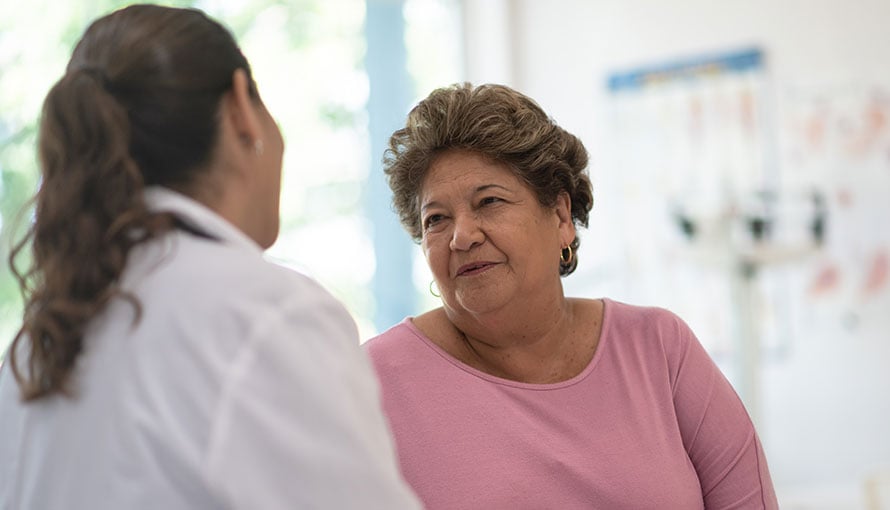CNS Lymphoma Information

Central nervous system (CNS) lymphoma is a rare type of non-Hodgkin lymphoma that affects white blood cells in lymph tissues of the brain, spinal cord or both. In some cases, the eyes and the cerebrospinal fluid that covers the brain and spinal cord can also be impacted. There are two types of CNS lymphoma: primary, which describes lymphoma that originates in the central nervous system, and secondary, which is cancer that develops elsewhere in the body then spreads to lymph tissues of the brain or spinal cord.
Around 1,500 cases of primary CNS lymphoma are diagnosed in the United States each year. Research suggests the incidence of this cancer is on the rise in older adults, although the reasons for this are unclear.
What causes CNS lymphoma?
The precise causes of CNS lymphoma aren’t yet fully understood. Most cases develop from uncontrolled dividing of cells derived from B lymphocytes, a type of immune cell. While the reasons behind this abnormal cell growth are still being explored, a major risk factor for CNS lymphoma has been identified—immunocompromised individuals have a greater chance of developing CNS lymphoma than those with a healthy immune system.
Factors that can weaken the immune system and increase a person’s risk for CNS lymphoma include:
- Organ transplantation
- Human immunodeficiency virus (HIV) or acquired immunodeficiency syndrome (AIDS) infection
- Congenital immunodeficiency syndromes
It’s possible for CNS lymphoma to develop in children, but adults over age 40 make up the large majority of cases.
What are the symptoms of CNS lymphoma?
The symptoms of CNS lymphoma usually develop over the course of a few weeks and can vary based on the precise location of the tumor. Unlike most other types of lymphoma, CNS lymphoma rarely causes night sweats or fever.
CNS lymphoma that affects the brain may involve:
- Nausea and vomiting
- Changes in behavior or mental alertness
- Headaches
- Facial weakness
- Hearing loss
- Seizures
- Confusion
- Unexplained pain, numbness or tingling sensations
If CNS lymphoma occurs in the spinal cord or spinal fluid, symptoms may include:
- Arm or leg weakness
- Back pain
- Trouble controlling bowel or bladder function
- Unexplained pain, numbness or tingling sensations
CNS lymphoma that involves one or both eyes can cause:
- Blurry vision
- Spots in the line of vision (floaters)
It’s important to remember that CNS lymphoma is uncommon and there are several other medical conditions that can lead to the above symptoms. Promptly consult with a medical professional If you are experiencing any changes in health or unusual symptoms that concern you.
How is CNS lymphoma diagnosed?
Diagnosing a rare and complex cancer like CNS lymphoma involves a combination of physical exams, imaging procedures and tests, all of which are available under one roof at Moffitt. The diagnostic process may include:
- A physical exam and review of medical history
- A neurological exam to assess coordination, reflexes and mental function
- Eye exams to view the inside of the eye, such as an ophthalmoscopy or slit-lamp biomicroscopy
- Blood tests to check red blood cell, white blood cell and platelet counts
- Magnetic resonance imaging (MRI) scans of the spinal cord and brain
- A lumbar puncture to collect a sample of cerebrospinal fluid from the spinal cord for testing
- A stereotactic biopsy to identify tumors and draw out a small tissue sample for testing using three-dimensional scanning technology and special instruments
Once diagnosed, CNS lymphoma is staged according to how far the cancer cells have spread beyond the original tumor site. There is no standardized method of staging CNS lymphoma at this time.
What are the treatment options for CNS lymphoma?
Details of CNS lymphoma treatment will largely depend on whether the patient is positive for AIDS. While there is no typical approach to treating a rare cancer like CNS lymphoma, some treatment options for AIDS-positive patients include:
- Chemotherapy, which may be paired with radiation therapy
- HIV medications
- Steroid therapy, which may be paired with radiation therapy
If CNS lymphoma is not related to AIDS, possible treatment options include:
- Chemotherapy, which may be followed by radiation therapy
- Steroid therapy
- Stem cell transplantation with high-dose chemotherapy
- Whole-brain radiation therapy
Targeted drug therapy that focuses on attacking specific types of cancer cells is another promising treatment option for certain patients. Surgery is rarely used to treat CNS lymphoma.
It’s possible to cure CNS lymphoma, although the cancer returns in about 50% of cases. Factors that will affect a patient’s prognosis include:
- The patient’s age and overall health
- Whether the cancer is related to AIDS
- The precise location of the tumor
- If and how far the cancer has spread
- The levels of certain substances in the blood and cerebrospinal fluid
CNS treatment is most responsive in patients who are younger than 60, do not have AIDS and whose cancer has not spread beyond the cerebrum. Still, advances in cancer treatment are steadily improving outcomes and quality of life for individuals with CNS lymphoma and other complex malignancies.
CNS lymphoma treatment at Moffitt
Treating rare diseases like CNS lymphoma is one of our specialties at Moffitt Cancer Center—Florida’s No. 1 cancer hospital and a National Cancer Institute-designated Comprehensive Cancer Center. Our diverse team of cancer experts includes hematologists, medical oncologists, neurologists, pathologists, radiation oncologists and other specialists who work collaboratively to deliver individualized and effective treatment. Furthermore, Moffitt physicians assist a high volume of patients and routinely address uncommon cancers that other professionals may see only a handful of times in their careers, if at all.
To speak with a cancer expert about your CNS lymphoma treatment options or learn about our trailblazing clinical trial program, contact Moffitt at 1-888-663-3488 or submit a new patient registration form online. A referral from your primary doctor is not required.
References:
National Organization for Rare Disorders
Leukemia & Lymphoma Society: CNS Lymphoma
National Cancer Institute: CNS Lymphoma Treatment
